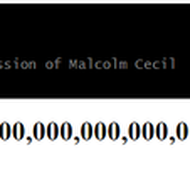Do we have to believe something (in order to cope with reality)?
Miguel Farias, in his article on "The Psychology of Atheism" argues that people cannot not believe, that when we discard one fundamental belief (or system of beliefs) we have to switch to another fundamental belief . A longer period of nonbelief would be rather unpleasant and difficult to maintain.
Farias calls this the belief replacement hypothesis:
"...those who reject religion, intuitively choose something else to replace it with. This can be briefly enunciated as the belief replacement hypothesis. Whether explicitly or implicitly, atheists will espouse various types of naturalistic beliefs that are meaningful, help them to explain the world and, ultimately, can play a compensatory role in dealing with adverse circumstances. Existentialism, New Atheism, Humanism and Marxism are examples of beliefs systems associated with atheism."
Nonreligious people in general may also use a faith in humanity’s moral progress to find comfort or security, in the same way religious people use their belief in God.
"... perhaps belief in science is emotionally reassuring when an atheist faces adverse situations, because it provides a tightly ordered understanding of the world that eschews randomness — similar to what religion achieves through the idea of a governing deity.
"This clearly lends support to the belief replacement hypothesis. Further, this finding has a relevance which extends far beyond the study of atheism and religion. It tells us something about the nature and role of beliefs. It seems that it is not so much the content of the belief, but its meaningfulness and strength that truly matters. Despite the difficulty in deliberately choosing what we believe in, beliefs offer structure to our lives, and we cling on to them when facing trying and uncertain situations."
(Miguel Farias, "The Psychology of Atheism" , in: The Oxford Handbook of Atheism)

Enjoy being online again!
Welcome to the community of good people who base their values on evidence and appreciate civil discourse - the social network you will enjoy.Create your free account
10 comments
Feel free to reply to any comment by clicking the "Reply" button.I believe I can get thru whatever life sends me, and find solace & pleasure in the little moments i remain alert to enjoy. What else do I need? Lotta words for not much, up above.......
Existentialism? New atheism? Humanism? Marxism?
Forget all of those, I chose to follow the only true purpose in life, making paperclips!
[decisionproblem.com]
This is the only purpose
I don’t understand why we have to have belief about the deep mysteries of reality. Why can’t we just not know. Of course in our daily lives we need beliefs in order to function,
I believe it’s time for my morning coffee.
It seems like the most common replacement mechanisms on this site:
Faith in God -> Faith in Leftist government.
Fear of Amageddon -> Fear of climate change.
So you would agree that there needs be something replaced to not believe in gods?
I see it as rather a sour grapes argument, "You have irrational beliefs too!" I should really examine this "Handbook" sometime.
I made two posts a while back adressing both of these things directly, but it didn't get much attention. I think this post by @matias is the missing piece that links these things together.
While politics are necessary for society to function, their immediate effect on the world makes people zealous in their support.
Climate change is very real, caused by humans and will fundamentaly change the world but it is very unlikely that it will kill the human race.
I eschew randomness, by reasoning there is no such thing as randomness.
Samewise Chaos. There are factors unknown to me that have consequences, Some of them I would find good some I would find pernicious. To believe in chaos or randomness is to give form to our ignorance, I do try to eschew that.
"Perhaps", Spoken as a true theist. The author is guessing and is not an atheist.
I am agnostic with regards to Muslims explaining Christian motivations, The same may be said for Christians explaining strawman Atheists.
If we must "believe" something, it would be in other humans, Either negatively or positively.
I personally feel that an outside perspective is valuable in understanding any belief system or disbelief system. We are all basically the same—these lines of division are pretty insignificant.
@WilliamFleming Perspectives are fine, When do apologists explaining another's position become dubious?
@CapriKious I can’t find where Farias expresses a belief in God. He is a very qualified psychologist with a strong interest in religion and spirituality. I feel that some of his points have validity.
It can be uncomfortable being psychoanalyzed. No pain, no gain.
Enjoy being online again!
Welcome to the community of good people who base their values on evidence and appreciate civil discourse - the social network you will enjoy.Create your free account
Share this post
Categories
Agnostic does not evaluate or guarantee the accuracy of any content. Read full disclaimer.








